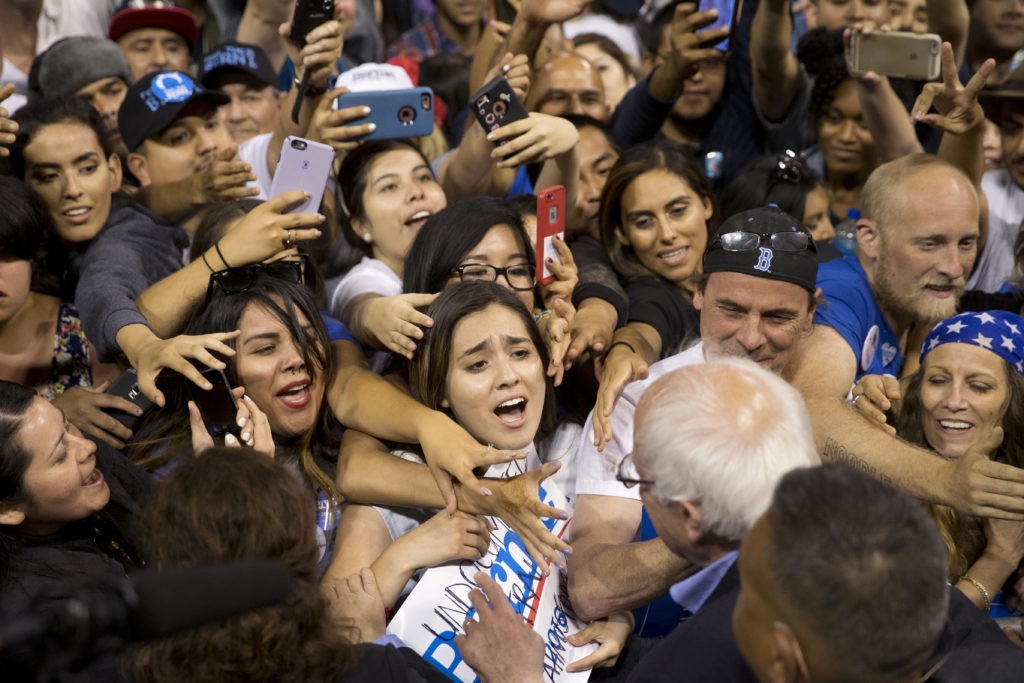SANTA MONICA — Sen. Bernie Sanders (I-VT) told hundreds of supporters in an airport hangar on Tuesday night that he would continue to campaign, despite the fact that Hillary Clinton had clinched the Democratic Party’s nomination.
The crowd knew the race was over, but cheered anyway, their voices echoing loudly off the corrugated iron ceiling, making it seem there were far more people in the room than there actually were. They were willing participants in a sad, and ongoing, illusion.
The truth is that Sanders neither expected to win, nor planned to win.
The proof was obvious as early as October, in the first Democratic debate in Las Vegas, when CNN’s Anderson Cooper raised the issue of Clinton’s email scandal — now the target of a serious FBI investigation — and Sanders gave her a pass: “Let me say something that may not be great politics. But I think the secretary is right, and that is that the American people are sick and tired of hearing about your damn e-mails.”
With that, I noted at the time, “Bernie Sanders excused Hillary Clinton for a) violating State Department policy on private e-mail; b) disposing of public records without authority; c) misappropriating classified materials; d) covering up possible misconduct and conflicts of interest.”
I did not foresee that Sanders would last so long — I overestimated Clinton’s strength — but there was hardly a path to victory if he declined to make the only ironclad case for rejecting our would-be first female president.
It is unfair, perhaps, to pick on Sanders — who, at least, began to talk about Clinton’s corruption with 48 hours left before the California primary. The truth is that not one Democratic politician has called Clinton’s email scandal what it is: disqualifying.
California governor Jerry Brown came closest, last August, when he said Clinton’s email scandals were “like a vampire” that she would have to put a “stake” through. Clinton continued to lie, and to evade — and Jerry Brown endorsed her anyway.
Democrats treat scandals differently than Republicans do. The GOP is tearing itself apart over Donald Trump’s comments on the federal judge in the Trump University fraud case.
These comments differ from past gaffes because they were not just the usual off-the-cuff political incorrectness. Trump appeared to apply a blanket rule against judges based on ethicity or religion. That is bigotry — and an assault on judicial independence, as well as the kind of mistake a Republican nominee cannot afford.
Trump also gave the Democrats a moral principle around which to rally. Hours before he attacked Judge Gonzalo Curiel in a San Diego speech, Trump had won the highest of moral high ground, when a left-wing mob waving Mexican flags and burning American ones attacked Trump fans, including women, outside a San Jose rally.
Smarter leftists worried that a public backlash could elect Trump. But instead of rallying Americans around the flag, Trump alienated even some of his supporters.
He will endure only because Clinton is so toxic. And Democrats have no standing to object to Trump’s rhetoric — not when they proudly choose judges based on race, not when they gave Barack Obama a pass for twenty years in Jeremiah Wright’s racist church.
Then, as now, not one Democrat stood up to say the obvious — that their party’s frontrunner no longer had any business holding public office. Democrats do not break under moral pressure. For the left, the party is the moral principle.
And that is why Sanders would not attack Clinton’s most vulnerable point. To him, corruption is Wall Street corruption, not government corruption: the state itself is above the law. His campaign was a fraud because the “democratic” in “democratic socialism” is a fraud.
Now, unless Attorney General Loretta Lynch defies her bosses and indicts Clinton, it falls to Trump — the most flawed candidate the GOP has ever nominated — to save the rule of law. Bernie wouldn’t even do it to save himself.
